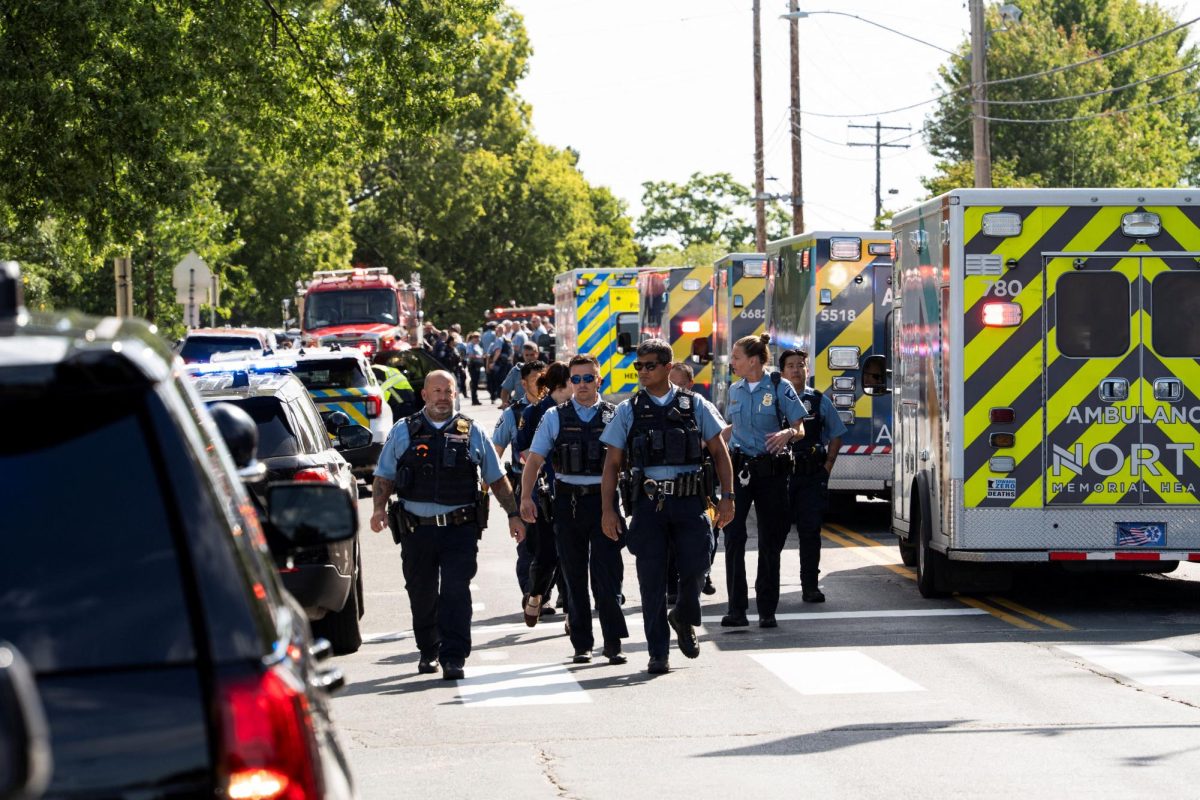
REUTERS/via SNO Sites/Tim Evans
Law enforcement walk past a row of ambulances, after a shooting at Annunciation Church, which is also home to an elementary school, in Minneapolis, Minnesota, U.S. August 27, 2025. REUTERS/Tim Evans
During a school-wide Mass at Annunciation Catholic School in Minneapolis, a shooter fired through the church windows. The tragedy left fifteen children and three elderly parishioners wounded, and two children killed: 8-year-old Fletcher Merkel and 10-year-old Harper Moyski.
The tragedy resonated deeply within Catholic school communities nationwide. SHS Director of Schools Mr. Richard Dioli, Principal Dr. Jennie Whitcomb, and Principal Ms. Francesca Brake expressed solidarity in a joint letter to the SHS community: “This event hits particularly close to our hearts, as the victims attend a century-old Catholic elementary school (PreK – 8) and were engaged in a celebration of the Mass to mark their first week back at school. Across our Sacred Heart campus, we grieve deeply with, and for, this community impacted.”
The U.S. Conference of Catholic Bishops echoed this pain, “Whenever one part of the Body of Christ is wounded, we feel the pain as if it were our very own children. Let us all beg the Lord for the protection and healing of the entire Annunciation family.” Similarly, Pope Leo XIV expressed that “while commending the souls of the deceased children to the love of Almighty God, His Holiness prays for the wounded as well as the first responders, medical personnel and clergy who are caring for them and their loved ones.”
Fr. John Whitney, the school chaplain, acknowledged the difficulty of finding meaning in such a tragedy: “There are no simple words to respond to these acts of violence—no prayer or Scripture passage that can console us for the incomparable loss of these two children and the wounding of so many others. And anyone who uses platitudes like ‘God’s will’ or something along those lines is unjust—both to the Scripture and to the children who have died.” Whitney drew on St. Augustine as the community prepared for the saint’s feast day, stating “God judged it better to bring good out of evil than to suffer no evil to exist.”
“What I think Augustine is saying,” Whitney reflected, “is that we are given a choice to respond to evil with more evil, or to see if we can bring some good out of this terrible, disordered, and vicious act. We won’t do that by answering evil with more evil—we only diminish the goodness of those who died and of the beautiful goodness of the children and adults who risked their own lives to protect their peers when we answer evil with more evil.”
Instead, Whitney urged the Sacred Heart community to embrace healing: “What we are all called to do now is to find a way to bring a greater good out of this evil—to pray not just for the victims but for the perpetrator, to become bringers of peace, to overcome darkness with light. We must become the resurrection in this moment, bringing life out of death; refusing to be part of the culture of violence and vengeance that so fascinates this country these days. To set aside the religion of the gun, and all that goes with it—false ideals of power and privilege, vilification of those who are different. That is the kind of courage we rarely find in people who simply bemoan the loss with vague promises of thoughts and prayers, but it is seen in the humanity of the community.”
Whitney wondered, “Who will we love more? Are we willing to become healers through our words and actions?” Whitney ended his reflection by offering a message of hope: “This will not stop all evil, but it can keep evil from overwhelming us. My prayer is that our mourning and pain may become a fire that drives out the darkness.”